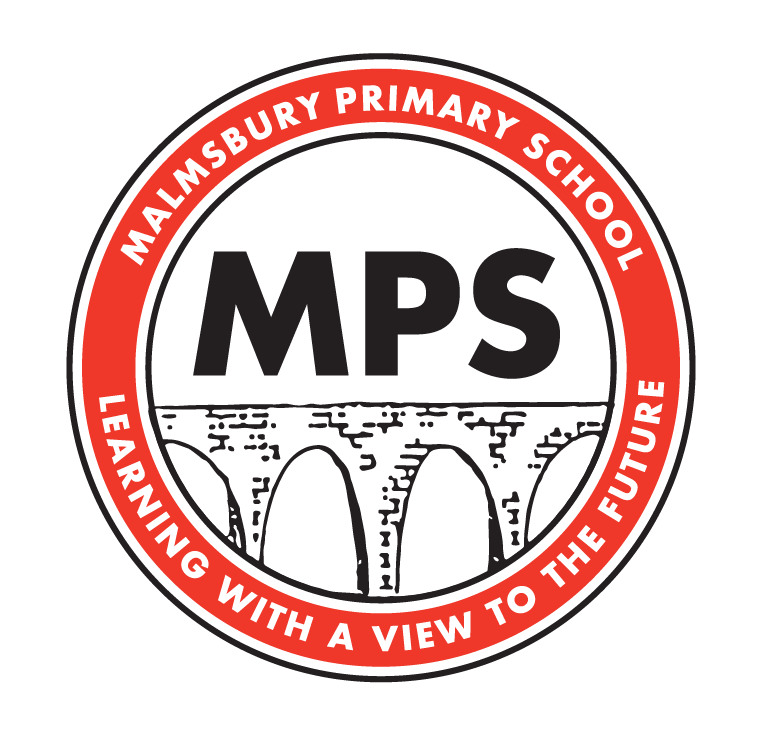Our curriculum
Specialist Subjects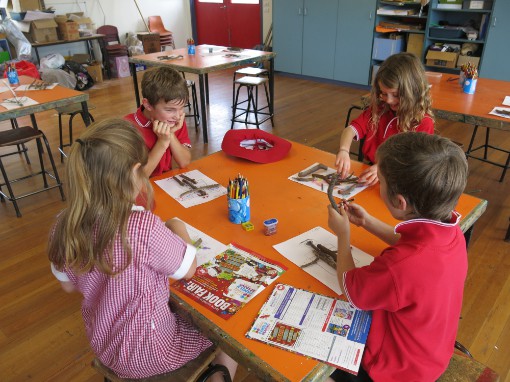
Visual Arts
The Visual Arts program at Malmsbury Primary School is based upon a teaching approach that provides the grounding in fundamental artistic techniques in order to allow students to develop into independent and capable young artists. The aim is to develop students who have appropriate skills in the technical questions of “how” to make art, thereby allowing them to fully express their artistic nature and focus more upon the deeper conceptual questions of “what” to make.
The four basic disciplines of the Visual Arts (drawing, painting, sculpture, and printmaking) are explored over an entire term each, in an incremental application of learning foci through the program over the year. Explorations of drawing’s basic elements, line and shape, from first term naturally leads into painting and further explorations of colour in term two. Two-dimensional art naturally leads into the sculptural third dimension in term three and the more refined techniques of sculpting materials leads into the more process driven approaches to making printed images in fourth term.
As students progress from year to year these four basic disciplines are revisited in successively more challenging and refined detail. The means by which young children use drawing and painting to communicate on paper develops into exploring how simple lines, shapes and colours can express their inner feelings and successfully depict their worlds through the practice of detailed observation. Basic sculpting techniques, such as modelling clay or paper craft develop over the years into more technically demanding processes and materials, such as papier-mache and mould making, as students learn to respond to the challenge of utilizing various media that best convey their creative ideas. Simple printmaking methods, such as monoprints, evolve into more complex processes such as engraving, lino-cutting and stencil art.
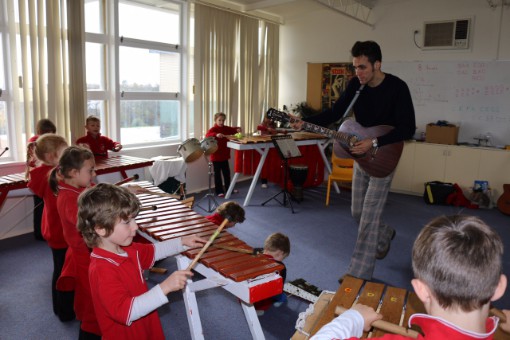
Performing Arts
The Performing Arts Program at Malmsbury Primary school offers many rich, experiential, and practical music making experiences drawn from a variety of methodologies, notably the Kodaly and Orff approaches to student-centered music making.
Students utilise a range of instruments including ukulele, marimba, Brazilian Samba percussion, boomwhackers, chime bars, ding boxes, untuned percussion, body percussion and voice to learn and create music in various ensemble situations. This collaborative approach to music making is key to students developing a rich understanding of the way their part fits into ‘the whole’ of a musical composition.
The Early Years focus primarily on singing games, simple partner and group dances, ‘echo’ songs and expressive movement to a variety of musical genres. By the Middle Years students are exploring more complex sung intervals, rounds, partner songs, pitched instruments and circus skills. The Senior Grades are where students can flourish in Ensemble/Choir and perform and devise increasingly complicated musical pieces utilising instruments as varied as Zimbabwean Marimba and Brazilian Samba percussion.
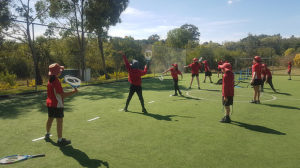
PE
The Physical Education program at Malmsbury Primary School is inclusive and engaging, providing students with skills and opportunities to become lifelong participants in physical activity.
In Foundation – Year 2 classes, students develop and refine fundamental motor skills through active play and structured movement activities. They explore the way their body responds to physical activity and how it makes them feel. Students explore a range of equipment that continues to evolve as their skills further consolidate and work independently, with small groups and as a whole class.
In Year 3 – Year 6 classes, students then further explore these fundamental motor skills and use them to develop specific game-based skills, such as football, netball, tennis and softball. Modified versions of these major games are played, allowing for gradual rule understanding and strategy development. Students explore leadership, problem solving, fair play and decision making.
The Physical Education program has also benefited greatly from the Sporting Schools program run by the Australian Sports Commission. This grant program has allowed us to purchase new sport-specific equipment and engage in dedicated programs on top of weekly PE classes, including cricket, lacrosse, gymnastics and tennis.
Students at Malmsbury Primary School participate in a swimming program run at the Kyneton Aquatic Centre during Term 4.
Each year the school holds a House Cross Country and Fun Run event and a House Athletics carnival. Students in Year 3 – Year 6 who qualify then progress and compete at inter-school events as part of the CDSSA.
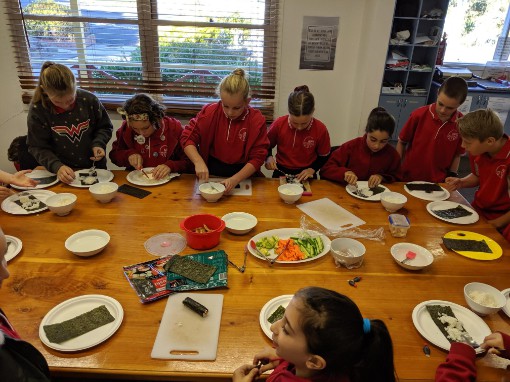
Japanese
At Malmsbury Primary School, we engage students in a fun and enriching Japanese program that focuses on key components of second language learning including communication and cultural understanding. Students attend one 60-minute lesson a week, where we cover a range of topics that encourage the skills of speaking, listening, reading, and writing in Japanese.
The Japanese program at Malmsbury Primary School is planned using the Australian Curriculum. Students complete various tasks each semester to demonstrate their abilities in communication and understanding. The junior years focus on simple language constructions such as greetings, counting and general classroom language. They can use simple, familiar vocabulary to build up their communication skills and gain confidence in learning a second language. The senior years expand on their prior language knowledge and focus on using language more creatively and informatively. They can use their skills to develop self-introductions, descriptions, and preferences.
In our Japanese classroom, we engage in a range of learning activities such as making Japanese written symbols using creative materials, role playing with props and costumes, labelling, and translating. We also use games, stories, and cultural events to guide our learning, as learning language in the context of culture assists in students’ retention. Extracurricular activities held throughout the year including community groups and cooking provide enjoyable opportunities for students to gain a deeper understanding of Japanese language and culture.
For more information, please feel free to view our Japanese display board in the assembly space, which is regularly updated with our learning foci and Japanese cultural events.
Learn more about our literacy program, numeracy program and community groups.
